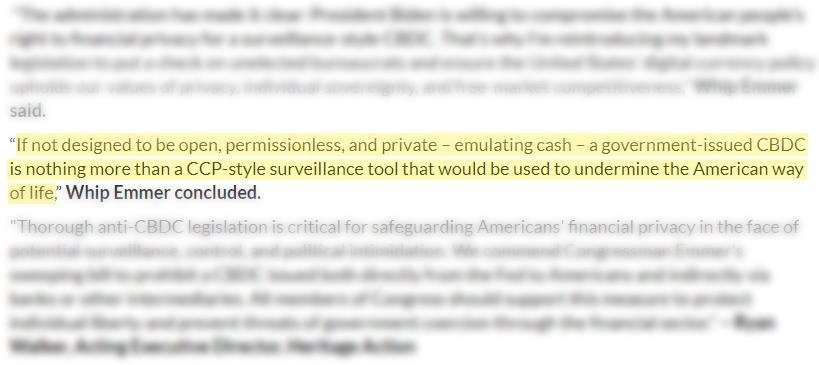The United States Financial Services Committee passed the first anti-CBDC bill, marking a significant milestone in the ongoing debate over financial privacy and government surveillance.
This historic legislation, spearheaded by Majority Whip Tom Emmer, boldly opposes what many in Congress fear could be the inception of an “ever-expanding government surveillance state.”
Congress Takes a Stand
With concerns drawn from the recent developments in China, where the financial system has been weaponized by the government, the bill aims to safeguard Americans’ financial privacy in the face of potential encroachments by the government into their economic affairs.
However, the bill’s fate in the Democrat-led Senate hangs in the balance, as the Senate Banking Committee remains a potential roadblock to this Republican-initiated legislation. The clash between privacy and government authority sets the stage for a contentious debate that will shape the future of digital currency regulation in the United States.
Emmer’s Vigilant Opposition
Before the momentous decision on September 12, Majority Whip Tom Emmer took a significant step by reintroducing the Central Bank Digital Currency (CBDC) Anti-Surveillance State Act. The primary objective behind this initiative was to forestall the issuance of a CBDC by the Federal Reserve, a move that could jeopardize the fundamental right of Americans to financial privacy.
The China Parallels
Whip Emmer warned that a government-issued CBDC, without a design focused on openness, permissionless access, and privacy akin to cash, could become a surveillance tool, mirroring CCP-style controls and potentially jeopardizing the American way of life.

CBDC vs. Bitcoin
While many might confuse CBDCs with bitcoin, it is crucial to distinguish their differences.
While the latter operates independently of governmental oversight, a CBDC represents a digital incarnation of sovereign currency. Central bank digital currencies are governed and transacted on a digital ledger under the control of the respective government, transforming them into what is often referred to as “programmable money.” This programmability potentially grants the government the ability to monitor and, in some cases, exert control over people’s financial transactions, as already evident in China.
Related reading : Iranian Parliament Warns Central Bank: CBDC Project Unlawful And Unconstitutional, Must Be Halted
Biden’s CBDC Push
Emmer has asserted that the Biden Administration’s strong support for a CBDC has been evident. He pointed out that several executive orders have emphasized the imperative nature of CBDC research and development. Nevertheless, these endeavor carries the inherent risk of exchanging the rights to financial privacy of American citizens in exchange for the implementation of a CBDC with surveillance-focused capabilities.
He added:
“The administration has made it clear: President Biden is willing to compromise the American people’s right to financial privacy for a surveillance-style CBDC. That’s why I’m reintroducing my landmark legislation to put a check on unelected bureaucrats and ensure the United States’ digital currency policy upholds our values of privacy, individual sovereignty, and free-market competitiveness,”
Emmer’s Anti-CBDC Warning
Drawing attention to China’s utilization of a CBDC as a tool to establish a social credit system, Emmer sounded an alarm about the perilous potential for governments to weaponize their financial systems against their own citizens.
In a parallel vein, the actions of the Trudeau Administration, which involved freezing the bank accounts of individuals associated with the 2022 trucker protests, serve as stark examples of the inherent risks involved.
Related reading : Canadian Truckers Use Bitcoin Crowdfunding To Fuel Freedom Protest
Legislation for Protection
Emmer holds a hardened belief that these strategies are ill-suited for the United States. He underscored the imperative for American digital currency policy to align with values centered around privacy, individual sovereignty, and the preservation of free-market competitiveness. These strategies stand against freedom in the United States and violate the constitution.
Preserving American Values and Safeguarding Innovation
To be precise, the CBDC Anti-Surveillance State Act sets forth a series of provisions designed to safeguard Americans’ financial privacy and maintain the integrity of the financial system.
Firstly, it unequivocally bars the Federal Reserve from directly distributing a CBDC to individuals, thereby preventing the Fed from morphing into a retail bank capable of amassing personal financial data from American citizens.
Secondly, the Act expressly forbids the Fed from indirectly issuing a CBDC to individuals through any intermediary, effectively preventing it from launching a retail CBDC within the two-tier financial system.
Lastly, it firmly restricts the Federal Reserve from utilizing any CBDC as a tool for implementing monetary policy, thus ensuring that a CBDC cannot be wielded as a means of controlling the American economy.
In essence, this legislation not only safeguards innovation but also safeguards the potential for future advancements in digital currency, preserving the American freedom.










